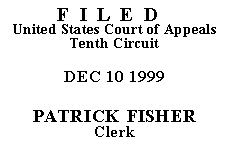

| UNITED STATES OF AMERICA,
Plaintiff-Appellee,
v.
PAMELA KIRSCH Defendant-Appellant. |
No. 98-3326
(D.C. No. 97-CR-10071) (D. Kan.) |
Defendant-Appellant Pamela Kirsch pled guilty to distribution of methamphetamine in violation of 21 U.S.C. § 841(a)(1). She appeals her sentence, and we affirm.
Ms. Kirsch entered into a plea agreement with the government in which she agreed to cooperate in exchange for the government's agreement to file, in its discretion, a motion for downward departure under section 5K1.1 of the U.S. Sentencing Guidelines. Unsatisfied with Ms. Kirsch's cooperation, the government decided not to file the motion, informing Ms. Kirsch of its decision only a few hours before her sentencing hearing. Ms. Kirsch requested and was denied a continuance to review and defend against the government's decision. The district court sentenced Ms. Kirsch to 121 months pursuant to the guidelines.
Ms. Kirsch first contends the district court's failure to grant a continuance at the sentencing hearing violated her due process rights by denying her the opportunity to review the government's reasons for not filing the section 5K1.1 motion. We review the denial of a request for a continuance for an abuse of discretion. See United States v. Garcia, 78 F.3d 1457, 1467 (10th Cir. 1996). A district court abuses its discretion to grant a continuance only if the denial is arbitrary and substantially impairs the defendant's opportunity to secure a fair sentence. See id. In the case at bar, Ms. Kirsch was not entitled to probe the reasons for the government's refusal to file the section 5K1.1 motion until she made a substantial showing that those reasons were unconstitutional. See Wade v. United States, 504 U.S. 181, 186 (1992). Ms. Kirsch did not allege any unconstitutional motive when requesting a continuance, but her counsel did state that he did not have "any constitutional basis at th[at] point" due to the late notice by the government, Rec., vol. II, Tr. of Sent. Hr'g at 3. Even on appeal, however, Ms. Kirsch has not come forth with any basis for contending the government had an unconstitutional motive for refusing to file the motion, and thus she has not shown that her opportunity to secure a fair sentence was impaired. The district court did not abuse its discretion by denying her request for a continuance. See, e.g, United States v. Bagnoli, 7 F.3d 90, 92 (6th Cir. 1993) (upholding district court's denial of continuance where defendant did not allege government was motivated by unconstitutional considerations in refusing to file § 5K1.1 motion) (citing Wade, 504 U.S. at 186).
Ms. Kirsch also argues the district court erred in failing to review the factual reasons offered by the government for not filing the section 5K1.1 motion. However, the district court had no authority to review the government's reasons absent the defendant's proffer of substantial evidence that the government's refusal was based on an unconstitutional motive. See Wade, 504 U.S. at 185-86. Ms. Kirsch did not meet this admittedly heavy burden.
Ms. Kirsch next contends the government breached its plea agreement with her by failing to move for the downward departure. Whether the government breached a plea agreement is a question of law which we review de novo. See United States v. Courtois, 131 F.3d 937, 938 (10th Cir. 1997). The government will be found in breach of the agreement where the decision not to file a section 5K1.1 motion was "animated by an unconstitutional motive or was not rationally related to a legitimate government end." Id. Ms. Kirsch does not argue that the government had any unconstitutional or illegitimate motive; rather, she asserts that she was deprived of her due process rights to notice and opportunity to be heard.
First and foremost, we are without jurisdiction to review defendant's claim that the government breached its plea agreement by declining to move for a substantial assistance departure without an accompanying argument that the government had an unconstitutional or illegitimate motive when committing the alleged breach. See United States v. Hawley, 93 F.3d 682, 691 (10th Cir. 1996). Even assuming Ms. Kirsch is arguing the government intended to violate her due process rights, such an argument is not persuasive. Ms. Kirsch knew prior to her sentencing hearing that the government retained complete discretion over whether to file the section 5K1.1 motion. See Plea Agreement ¶2(b), Rec., vol. I, doc. 213 ("If the defendant's cooperation, in the sole discretion of the United States Attorney, amounts to substantial assistance pursuant to section 5K1.1 of the Sentencing Guidelines, a motion for departure from the guidelines will be filed.") (emphasis added). If Ms. Kirsch wanted complete assurance that the motion would be filed, she could have negotiated such an agreement. See, e.g., Courtois, 131 F.3d at 938 ("The government may bargain away this discretion . . . in a plea agreement."). Since Ms. Kirsch had advance notice of the government's discretion, she cannot claim a due process violation for the government's exercise of it.
For the foregoing reasons, the sentence imposed by the District Court is AFFIRMED.
ENTERED FOR THE COURT
Stephanie K. Seymour
Chief Judge
*.This order and judgment is not binding precedent, except under the doctrines of law of the case, res judicata, or collateral estoppel. The court generally disfavors the citation of orders and judgments; nevertheless, an order and judgment may be cited under the terms and conditions of 10th Cir. R. 36.3.